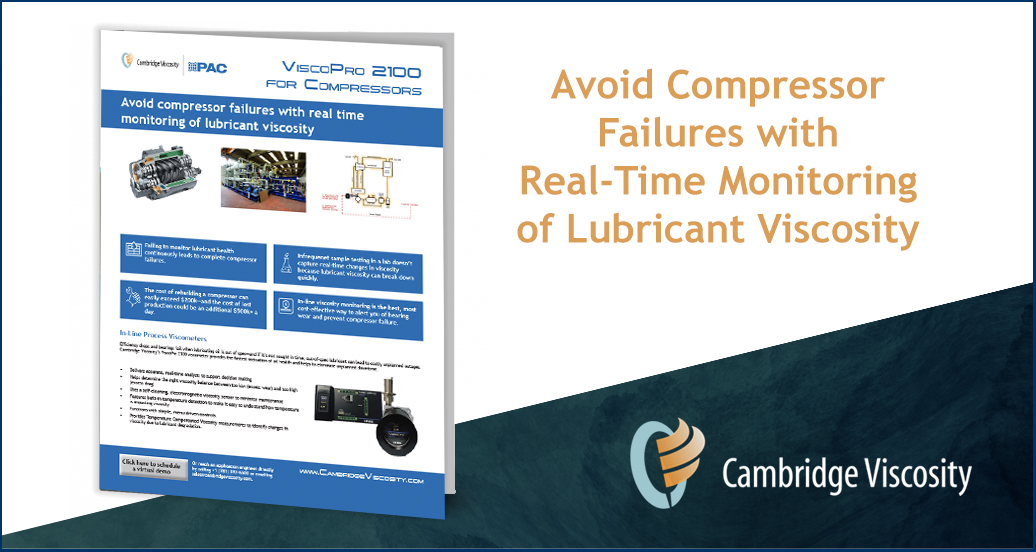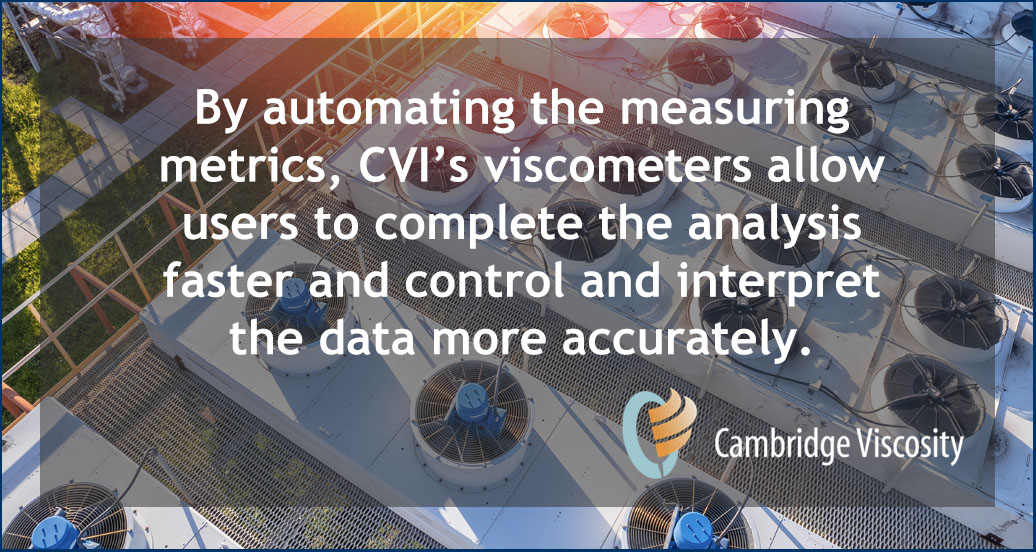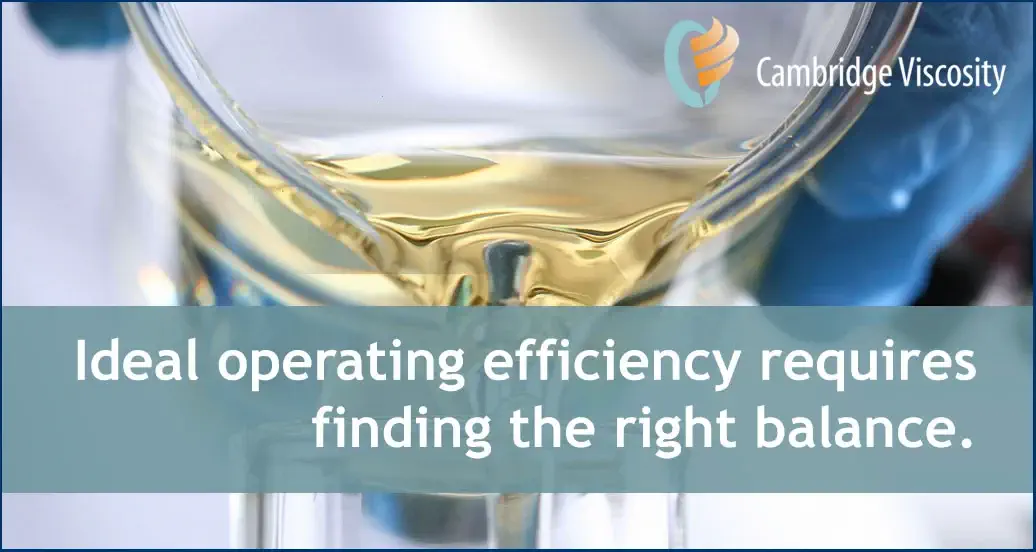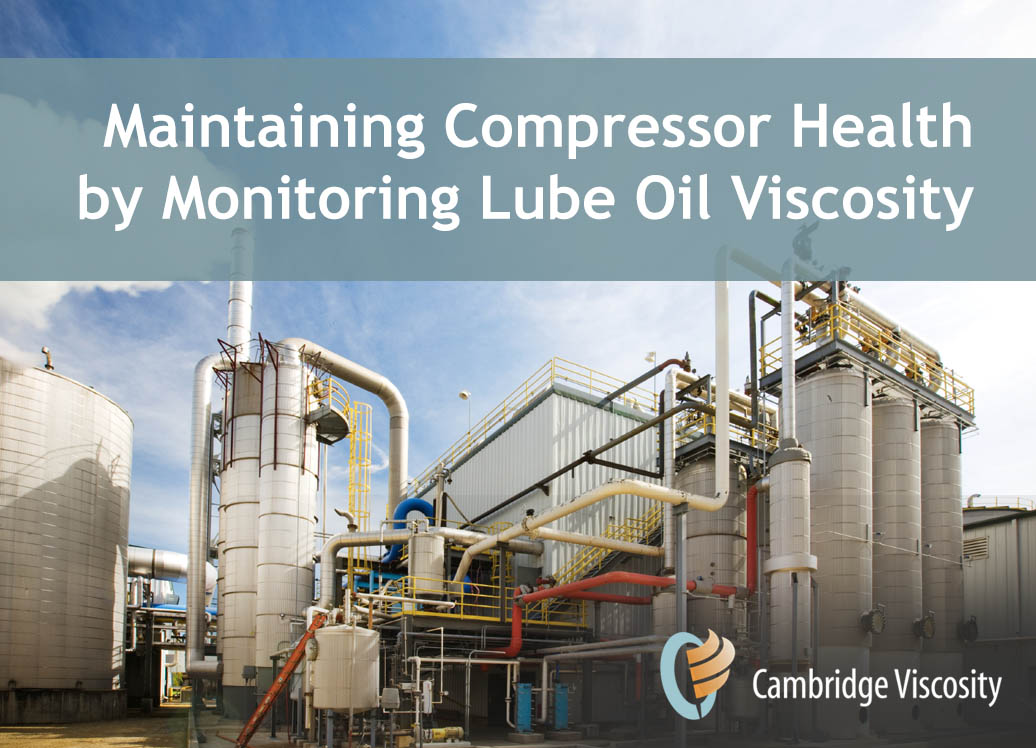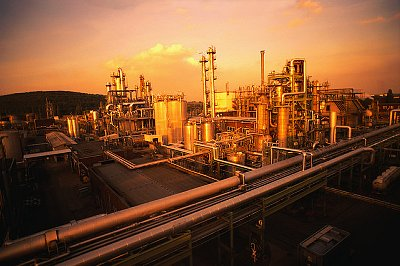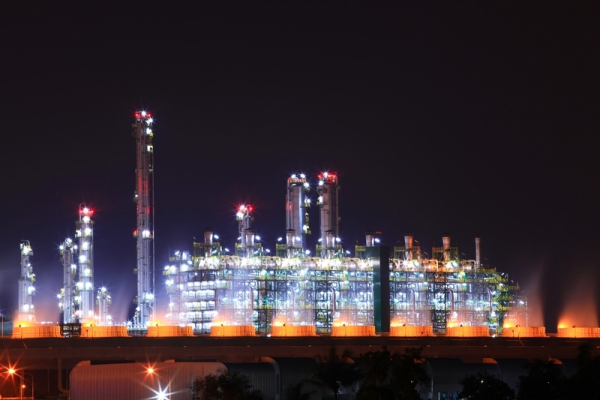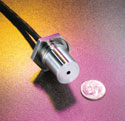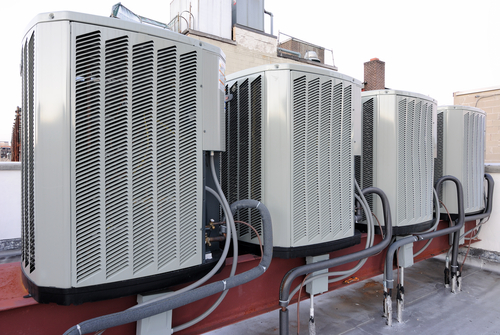Click to download the one-page pdf detailing how Cambridge Viscosity helps refineries avoid compressor failures.
Avoid compressor failures by monitoring lubricant viscosity
May 18, 2023 9:14:35 AM / by Admin posted in gas compressor, compressor viscosity, ViscoPro 2100
Profile of Dr. Chris Seeton: How CVI helps support a cleaner future
Oct 13, 2022 8:33:51 AM / by Patrick Riley posted in compressor viscosity, lab viscometer, refrigerant viscosity, 372 sensor
Chris Seeton is widely considered to be an expert in the compressor/refrigerant industry. He has the notable distinction of being the person who won the first battle that allows new low global warming refrigerant regulations to come into effect by serving as the Global Technology Leader at Honeywell and leading the industry’s effort to replace R134a with R1234yf which came to fruition in 2015 (an EPA CAFÉ credit of 13.8 gCO2/mile or ~3 mpg per vehicle by just changing the refrigerant). Even today, he continues to drive change in the industry by leading two cooperative research project groups through SAE on developing new heat pump systems for electric vehicles.
Regulatory Uncertainty Drives Demand for Explosion-Proof Technologies
Jul 14, 2021 1:30:16 PM / by Patrick Riley posted in explosion-proof, viscosity measuring solution, viscosity control, gas compressor, compressor viscosity, refrigerant viscosity
Air conditioning systems use refrigerants to do the job of cooling an indoor space. These refrigerants, in the form of hydrochlorofluorocarbons (HCFCs), potentially contribute to climate change, and are currently being phased out of use in the United States. The phaseout approach, which was initially started in 2010, gives manufacturers time to develop ozone-friendly refrigerants as an alternative.
An interview with CVI Rep Suzhou TAIEN about the Compressor Industry
Jun 17, 2021 12:12:25 PM / by Patrick Riley posted in viscosity measuring solution, viscosity control, gas compressor, viscosity management, compressor viscosity
Did you know we have a global representative network that supports Cambridge viscometers all over the world? We decided to reach out to a few of them to get their thoughts on the compressor industry. The first rep we talked to is Suzhou TAIEN, who is responsible for viscometer sales and support in China.
Finding the right balance of lubricants and refrigerants
May 11, 2021 8:08:00 AM / by Patrick Riley posted in 571 sensor, viscosity management, compressor viscosity, process viscometer
When it comes to air conditioning and compressor systems, achieving ideal operating efficiency is about balance. Too much lubricant means the compressor or cooling system won’t cool properly, and too much refrigerant increases bearing wear and reduces the system life. Thicker oil lubricates better, but it also means there is an increase in drag, and more power is needed to rotate the compressor. Manufacturers must consider all these variables when manufacturers designing their equipment. Each new design requires significant testing to ensure performance and energy efficiency.
VISCOpro Used in Research to Analyze Viscosity in a Rotary Compressor
Apr 29, 2021 8:31:44 AM / by Patrick Riley posted in 501 sensor, viscosity measuring solution, viscosity control, research, compressor viscosity
When compressor manufacturers design a new compressor model, part of the process includes determining the type of refrigerant and the accompanying lubricating oil, which is necessary to reduce friction on metal parts, reduce wear on the compressor, and extend the life of the system. The company must conduct extensive testing to ensure proper energy efficiency and functionality. The lubricant has a significant impact on the performance of the compressor. Over-lubrication can impact the compressor’s ability to cool properly, but too much refrigerant will lead to more wear and a shorter compressor lifecycle.
Oil condition monitoring for lube oil monitoring on screw compressors
Feb 17, 2021 11:55:02 AM / by Patrick Riley posted in viscosity control, viscosity management, compressor viscosity, in-line viscometers, ViscoPro 2100
Managing lubricant viscosity is essential to maintaining the health of a compressor in a process plant, because a single compressor failure can cost $10,000 a day or more in lost revenue. Considering it’s another $10,000 to rebuild a compressor, or more than $100,000 to replace a compressor, maintaining the health and performance of compressors is important.
Perfecting Compressor Refrigerant-Oil Balance
Jun 18, 2019 8:00:00 AM / by Admin posted in PVT, oil analysis, compressor viscosity, refrigerant viscosity
For Immediate Release
Major Refinery Improves Profitability with Viscosity Monitoring
Apr 1, 2019 10:00:00 AM / by Admin posted in process viscometers, 392 sensor, oil viscosity, monitor viscosity, refining, VISCOpro1600, compressor viscosity
Boston—Machinery failures, downtime and maintenance labor costs can kill a refiner’s bottom line profits. A major US oil company with refinery installations in North and South America has installed several Cambridge Viscosity VISCOpro viscometers to monitor oil viscosity, providing engineers with real-time information on oil quality. The viscometers utilize Cambridge’s 392 process sensors and are Class 1 Div 1 Group B, C, and D certified.
Expanded Lubrication Oil for Gas Compressors
Mar 12, 2019 7:59:00 AM / by Admin posted in process viscometers, lube oil, refining, gas compressor, oil monitoring, compressor viscosity
FOR IMMEDIATE RELEASE
Lube Oil Viscosity Testing For Optimal Compressor Performance
Jul 18, 2018 12:00:00 AM / by Admin posted in VISCOpro2000, process viscometers, lube oil, lube oil viscosity, 571 sensor, compressor viscosity
Boston—Danfoss Compressors is using a Cambridge Viscosity small sample viscometer to test refrigerant and oil mixtures at their Tianjin, China factory.
The viscometer includes the Cambridge VISCOpro2000 electronics and SPL 571 lube oil viscometer sensor with multiple piston ranges to test compressor performance using new combinations of lube oils and refrigerants. The lower the viscosity of this mixture, the more efficient the compressor is. However, if viscosity is too low, the compressor can wear out prematurely. By achieving the optimal balance of efficiency and lubricity, the company can improve compressor performance while using more environmentally friendly refrigerants.
Danfoss engineers cite the viscometers’ ease-of-use, robust functionality and high degree of accuracy among the chief reasons for their use. The VISCOpro2000 enables users to monitor critical fluid processes and capture real-time data. The addition of the 571 sensor—used extensively for compressor, used oil analysis, on-engine and hydraulic fluid applications—provides for installations where form factor and small sample volume are important. “Danfoss was restricted in the amount of area they had, and Cambridge’s miniature lube oil viscometer is the perfect choice when limited to tight spaces,” explains Cambridge Viscosity China Agent Miker Wang of Suzhou TAIEN.
Cambridge’s viscosity management technology is based upon a simple and reliable electromagnetic concept. Two coils move the piston back and forth magnetically at a constant force. Proprietary circuitry analyzes the piston’s two-way travel time to measure absolute viscosity. A built-in temperature detector (RTD) senses the actual temperature in the sampling chamber. Constant in and out motion keeps samples fresh, mechanically scrubs the sampling area and provides excellent viscosity tracking.

About Cambridge Viscosity
Cambridge Viscosity, a leader in small sample viscometer systems for laboratory and process environments, designs automated viscometers used worldwide in petroleum, exploration and refining applications to ensure accurate viscosity in both lab and operations. Cambridge’s worldwide reach is important for providing application engineering support and service wherever and whenever needed.
Cambridge Viscosity’s sensors and viscometer systems conform to ASTM, DIN, JIS and ISO standards, with a range of models designed to meet specific industry and application needs.
Online Viscometer Ideal for Gas Compressor Lubrication Oil
Jan 30, 2017 10:10:00 AM / by Admin posted in process viscometers, lube oil, 392 sensor, lube oil viscosity, oil analysis, compressor viscosity
FOR IMMEDIATE RELEASE
CVI Compressor Viscometer Used As Industry Standard Worldwide
Jan 23, 2017 10:00:00 AM / by Admin posted in process viscometers, 501 sensor, 571 sensor, refining, compressor viscosity, refrigerant viscosity
Boston—Cambridge Viscosity compressor viscometers have become the refrigerant industry standard worldwide. Compressor manufacturers are always looking for ways to improve their products and enhance energy efficiency, while also using more environmentally friendly refrigerants. Viscosity is an important metric, as the ideal refrigerant blend allows for optimal output of the compressor.

